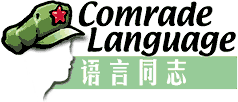|
The Chinese equivalent of the TV guide is the meizhou
guangbo dianshibao (TV Weekly). But your faithful Comrade
knows that not all foreign friends can read Chinese
characters. That's why he's prepared this week's shiji
(practical) guide to Chinese television.
Believe
it or not, there are still some laowai out there who
don't get Star TV. Funny how the people who do get Star
TV are usually also the people getting hardship allowances
from their companies. While the gaogan zidi (children
of high officials) are watching CNN and Baywatch, us
laobaixing (common folk) are stuck with Chinese game
shows where the big winner takes home a RMB5 bag of
prawn crackers. I guess that's a suitable prize for
correctly answering questions like "Are bats birds?"
and "What does an anteater eat?"
First it should be noted that Chinese television jiemu
(programs) have a tendency to begin and end at the most
xiangbudao (unexpected) times. It's not uncommon for
a broadcast to start at 7:08 and end at 7:27, and unless
you know in advance what time the show ends you'll never
be able to guess from the events in the program itself.
Programs often end abruptly while someone is in mid-sentence,
or before you've even figured out the qingjie (plot).
As a matter of fact, most Chinese TV shows consist of
little more than qingjie fazhan (plot development).
Like sex at the Comrade's age, rarely is there a gaochao
(climax).
At
almost any given time of the day or night, you can be
sure of encountering the following programs as you flip
through Beijing's TV stations.
1. Sporting Events (yundong jiemu). In China,
these consist mainly of pingpangqiu(ping-pong, or table
tennis), paiqiu (volleyball), zuqiu (soccer, or football
if you're from the Commonwealth) and lanqiu (basketball),
featuring washed-up foreign basketball "stars" who play
on the Chinese teams.
2. Soap Operas (feizaoju). These are good for
a laugh, although they're not guyi (intentionally) funny.
The next time you watch a Chinese xiju lianxuju (drama
series) on TV, count the number of times the leading
actor turns his/her head (either slowly and thoughtfully
or quickly and excitedly) in one episode. Usually not
a word can be spoken in those shows without a head being
turned. It's a rule or something. Chinese soap operas
include wudapian (kung-fu fighting movies), which also
involve a lot of head turning. There's the slow head
turn, where the old kung-fu master turns to smirk at
his challenger, and the "land-on-the-ground-and-turn-head-quickly-to-look-at-opponent"
head turn. The foreign soap operas and drama series
chosen for Chinese TV aren't much better. Some popular
shows feature a deaf detective who reads lips and a
team of fashion models who moonlight as private investigators.
3. Comedy Series (youmo lianxuju). Not as funny
as the soap operas, Chinese sitcoms are hilarious if
you like to watch people sneeze and fall down. The only
way to tell comedies apart from other types of shows
is by the laugh track.
4. Book Reading (shuoshu). This concept started
as a wuxian diantai jiemu (radio program), until some
tiancai (genius) figured out that book reading could
just as easily be a hit on TV. Meant for those with
really short attention spans, book-reading shows are
just that: a show where some guy wearing lipstick narrates
a whole book while making exaggerated gestures with
one hand and fanning himself with the other.
5. 'Cross-talk' (xiangsheng). The literal translation
of this word is "cross-talk," but what it really means
is "two guys in dresses talking to each other." The
actors are usually Chinese, but on special occasions
you can catch a Chinese-speaking Canadian guy shaking
his linguistic cakes for cash, cross-talking in Chinese
about such absurd topics as what foreigners eat for
breakfast.
6. News (xinwen). In order to watch and understand
the news in Chinese, the first thing you have to get
straight is that wo guo means "China." Rule #2: Anything
that at any time in Chinese history was considered bad
can now be considered good, provided the words "with
Chinese characteristics" are added to the name.
7. Chinese Opera (xiju). Ci er (shrill) about
sums it up. Foreigners simply can't xinshang (appreciate)
something as complex as Chinese opera, which has 5000
years of history and tradition. It's more than just
men and women shrieking on a stage - it's men and women
shrieking on a stage in colorful outfits.
8. Movies (dianying). The ones you'll see on
TV are mostly geming dianying (revolutionary flicks).
These are the old war movies about how the CCP won World
War II single-handedly by defeating the Japanese imperialists
with farming tools.
Usually the best acting you'll see on Chinese TV is
in the guanggao (commercials). The music used in Chinese
TV commercials can't be topped: the theme song from
Star Trek in a bicycle commercial, a saxophone rendition
of "My Way" in an ad for chocolates and that song "All
That She Wants is Another Baby" in a commercial for
planned childbirth. Which brings me to the xuanchuan
guanggao (propaganda commercials), which teach people
to be model citizens by explaining how they must learn
to be filial from watching the behavior patterns of
crows.
Another kind of commercial, the xinxi guanggao (infomercial),
is now taking China by storm. Items like automatic potato-peelers
or electronic apple-corers which never sold in their
home countries are now being marketed in China in a
desperate attempt by their "inventors" to get rid of
them. What these foreign entrepreneurs don't seem to
understand is that people won't spend three-quarters
of their monthly salary for a tap water purifying device
when they don't even have zilaishui (running water).
One of the few places you can hear pure, unadulterated
Mandarin is on television. So if you're not too busy
playing golf or sitting in the sauna, try watching Chinese
TV to improve your tingli (listening skills).
|


